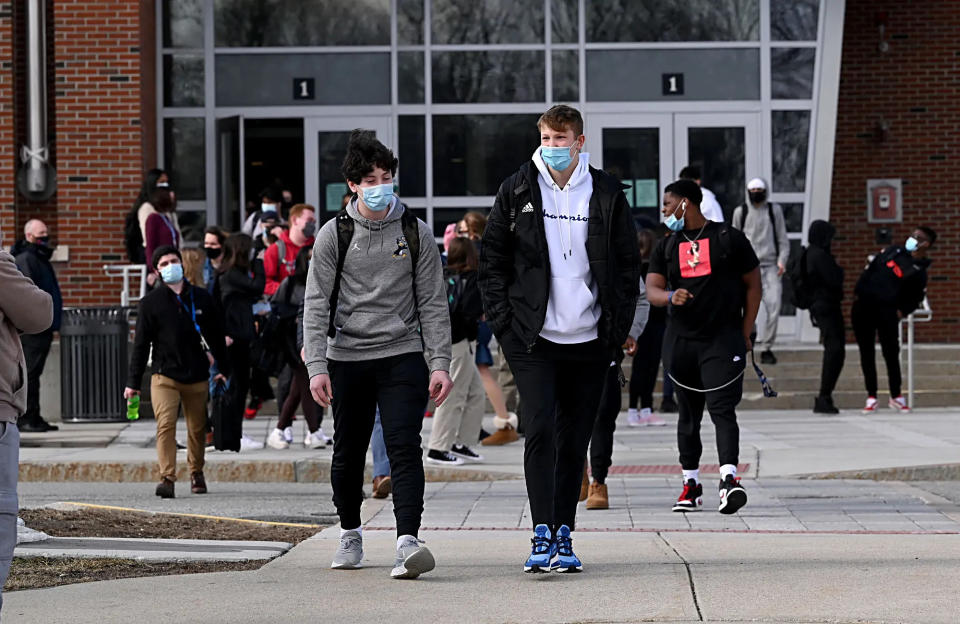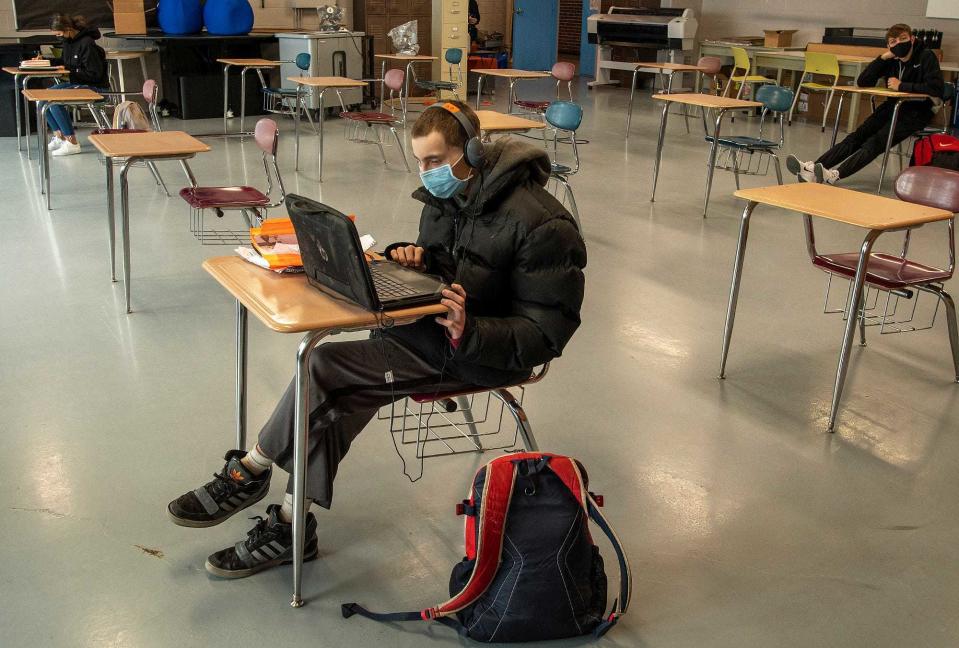Advocates are educating families on how to opt out of upcoming MCAS
When Ricardo Rosa isn't teaching educational leadership and policy studies at UMass Dartmouth, he's instructing parents on how to opt their children out of the Massachusetts Comprehensive Assessment System.
The part-time lecturer is a member of Citizens for Public Schools, a growing organization striving to abolish standardized testing in Massachusetts.
"It's a deviant process, in the sense that education just becomes about strategies to beat a test," said Rosa, who opted his son out of the eighth grade MCAS 10 years ago.
While passing the 10th grade MCAS is a requirement to earn a high school diploma, he said there is no state penalty for students who opt out in grades 3-8.
Pandemic pressure: MCAS scores indicate COVID-19 continues to weigh on student performance
Rosa said his son was pressured into taking the MCAS at a New Bedford middle school despite being taken to the nurse's office earlier that day for an illness.
"It was disturbing that the school was doing everything in its power to keep him in, even though he was not well," Rosa said.

Later that day, Rosa opted him out of the test and faced no consequences for his decision. He decided he wouldn't allow his children to take the tests in elementary and middle school.
Rosa serves on Citizens for Public Schools' executive board, a nonprofit that helps families understand the MCAS and their opt-out options. The organization's website includes opt-out letter templates for parents to send to principals and blogs detailing families' MCAS experiences. The group — consisting of parents, former teachers and educators around the commonwealth — also has a campaign for a moratorium on state standardized tests.
MCAS waiver: Three years after his class graduated, Marlborough man receives high school diploma
Citizens for Public Schools’ Executive Director Lisa Guisbond said the tests destroy children's love of learning and disproportionally impact special needs students and those from lower-income backgrounds. Guisbond previously served on Gov. Deval Patrick's readiness project subcommittee on MCAS, where she helped develop a set of recommendations to improve Massachusetts K-12 assessments.
The Massachusetts Department of Elementary & Secondary Education said standardized assessments inform the state where to focus its efforts and help parents check their child's and school's progress. But officials added: “If students don’t want to take the MCAS, and the parents/guardians agree, schools are encouraged to obtain their signatures on a form to document that the opportunity was offered and refused.”
While there is no hard data on how many students opt out each year, the state provides MCAS participation rates. The 2022 report revealed 98% of students participated in the eighth grade science and technology test — the lowest turnout out of all grades.
Push to stop MCAS
One of the parents Rosa mentored was Nelly Medina, who opted her nephew — whom she has legal custody of — out of his third grade MCAS in November. She said they were the only family in the class choosing this route.
Medina said the principal told her opting out would not affect her nephew's overall grade, but they are currently unsure what he will do when others take the test in the spring.
Medina, who works with Citizens for Public Schools, said she hopes the state will stop administering the MCAS by the time her children are in grade 10. She fears these tests will determine their intellect.

Former teacher Deb McCarthy said she recently reached a point where she couldn't administer the MCAS.
For the last two years, McCarthy refused to give the state's standardized test to her fifth grade class at Jacobs Elementary School in Hull. The school put her on administrative leave for requesting conscientious objector status.
Initially, she saw the tests as an accountability measure, but McCarthy soon noticed their negative impacts — students were becoming more stressed and anxious as the testing regime escalated.
Learning disrupted: State lawmakers file several bills addressing future of MCAS
The tests started taking prominence in her fifth grade curriculum. McCarthy, who taught in the Hull Public Schools for 25 years, said 24 days in the school year were dedicated to testing.
"Prior to the overemphasis on high-stakes testing, I had my students memorize a poem a week," McCarthy said. "They would perform plays and create songs and raps about the learning around a standard."
She added educators don't have an opportunity to help students who make mistakes on the tests because results are released during the summer.
'Victims of intelligence tests'
Throughout her teaching career, she educated parents in other districts on how to opt out of the tests. She quit teaching after last school year and is now vice president of the 115,000-member Massachusetts Teachers Association.
"You may have students who were victims of intelligence tests being measured by a score, and so there will be feelings of lack of confidence," McCarthy said.
Not every parent agrees with opting out.
A Milton district parent said standardized testing effectively showed what subjects her children need extra support with. She said their son received extra help in biology following a low test score in their grade 8 MCAS.
"It's a measurement of if teachers are doing their job and where the kids are weak," said the parent, who added they were unaware students could opt out of the test.
Ed Lambert, executive director of the Massachusetts Business Alliance for Education, said MCAS provides an opportunity for parents to receive real-time information on whether their children are ready to move on to the next grade and if their classroom is delivering quality education.
"MCAS is one test administered to all students, so if you're going to remove your student from them, why aren't you removing them from all other tests that teachers might give?" Lambert asked.
Tricia Lederer, the MBAE’s director of communications, added parents shouldn't opt out this year given the learning losses experienced because of the pandemic.
"There may be no more important time than now to have a sense of where your child stands against statewide standards," Lederer said. "Now is the time you need a good picture of where your student is so that you can advocate for them."
Erin Seaton, an education lecturer at Tufts University, disagreed with Lambert and Lederer, saying the MCAS presents meaningless data to parents because they don't see the questions asked and have no sense of potential challenges.
"You don't get back something that shows your child's skills, you get a score, and it shows at the bottom the number of the questions that a child got right or wrong," Seaton said.
Seaton said she is excited by the opt-out movement and believes parents should be able to stand up for what they feel is right for their children.
"This is a promising next step in rethinking whether or not we can abolish or change assessments."
This article originally appeared on MetroWest Daily News: MA Advocates educate families on opting out of MCAS standardized test

